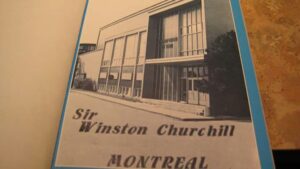I wish I had one thousandth of the descriptive ability of Somerset Maugham so that I could do real justice to some of the teachers I had during grade school (1-7) and high school (8-11).
If only Willie could get his hands on Miss Chesnie (Mildred) for example, who taught history in grade 9. It is hard to decide what was her most salient characteristic: her Scottish accent or her dyed red hair. Often only a few people understood what Miss Chesnie was actually talking about; after class was dismissed, we would try to understand what was our homework lesson. “Make notes on the Cro-Magnon man” was what she said, explained Howard.
In an attempt to knock French into our dumb skulls, we all had so many French lessons that we all should have turned out fluent Francophones. Unfortunately, this was not the case. Monsieur Langlois was sure that the best way of teaching French was to talk only French in class-and as a result, we often understood next to zero. As new technology crept in, we were all put in a French lab, where ¾ of the time, the equipment malfunctioned or we wasted time conjugating verbs. Our French teachers were supposed to monitor us in the lab, but I remember seeing one of them outside in the snow, smoking. Luckily, an affair with Denise T (whom I met skiing) taught me all the French I ever needed.
Now one of our English teachers threatened us that if we did not do our reading assignment, “I will cut off your arms and beat your over the head with the wet end”. Later this poor chap had a nervous breakdown-and I will not, out of respect, mention his name.
For some reason, all the boys were taught metal work. My Dad assured me it would come in handy. The only thing I remember about Mr. Alcock, the metal work teacher, was that he claimed that the “Beverly Shears” is a “great piece of equipment”. Alcock also insisted we call him “sir”.
On the other hand, Mr. Snow, the woodwork teacher, focused on quality. “Do you call that smooth?”, he said as he passed around checking the ashtrays we were making. My Dad told me that “for a kid with two left hands, that’s not bad” when I finally brought something home.
Grade 6 was probably the first year that I was introduced into what is called today Diversity. Our home room teacher was a born-again Christian named Ms. Pert, who insisted that we sing “we are climbing Jacob’s ladder, soldiers of the cross”. Now some of the Jewish kids in the class felt uncomfortable with that, although I didn’t. However, I did not feel ok with any prayer with ended with “thru Jesus Christ our Lord”. Pert would watch like a hawk to see who avoided these words.
During high school, Don Coolbrooke taught us Latin, English and History. Apparently, he was a jack-of-all trades. It is impossible to invent a more boring teacher than Mr. Coolbrooke. In retrospect, he could have been a great anesthesiologist. He had more quirks than Mr. Monk. After school, Wifey would pick him up in a green Pontiac-with a huge dog in the back seat. I remember hearing her say, “hurry up and get in; I’m freezing my ass off”. I shared that information the next day.
Of all the useless things I learnt in school, “technical drawing” beat it all, hands down. Mr. Stacey, a tall, cool, calm and collected guy tried to inculcate us with how to draw and use a slide ruler. I was never very good at that, and I asked my Dad for help. “We did not have that shit in my day”, said Dad smoking away at his Export A and doing his crossword puzzle.
Miss Williamson, the grand librarian of Winston Churchill High, knew me very well. When I walked into the library, she would say “I have something for you”. And she always did.
It was only in McGill when I started to love learning, and as I aged, I loved to learn more and more. However, I am grateful to all those who taught me. They must have done something right.


